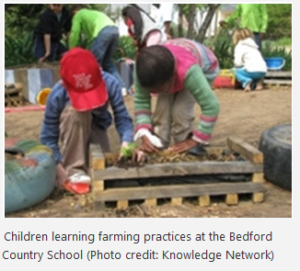 Farmers are a wealth of information. Many have developed kills and knowledge that others might benefit from to improve harvests and livelihoods. Organizations like the Africa Rice Center, are helping farmers to share skills and knowledge with each other across great distances and language barriers.
Farmers are a wealth of information. Many have developed kills and knowledge that others might benefit from to improve harvests and livelihoods. Organizations like the Africa Rice Center, are helping farmers to share skills and knowledge with each other across great distances and language barriers.
Through the use of farmer to farmer videos, the Africa Rice Centre has allowed rice farmers in Guinea to learn about improving the quality of their rice seeds from farmers in Bangladesh. By combining the knowledge of researchers, rice farmers, and rice processors, the Centre has created videos that can educate other farmers on seed drying and preservation, rice quality, seedbed preparation, and soil fertility management.
According to Louis Béavogui, a researcher at theInstitut de recherche agronomique de Guinée(IRAG), “watching the videos on seed has stimulated them [farmers] to start looking for local solutions to common problems that farmers face. It is by drawing on local knowledge that sustainable solutions can often be found at almost no cost.”
Going beyond simply connecting farmers with other farmers, the Acara Institute, founded two years ago, has been creating linkages between the corporate and the agricultural worlds. As part of the Minnesota University’s Institute on the Environment, Acara has created a partnership between students in the U.S. and India. Students have to compete in the Acara Challenge, where teams of 15 American and Indian students create business plans to address issues such as hunger and poverty. The founder, Fred Rose, has fostered an environment where students can collaborate and learn from each other, even while being miles apart.
Another organization that connects students from around the world is Bridges to Understanding. This Seattle-based non-profit uses digital technology to empower and connect children in seven countries: Azerbaijan, Cambodia, Guatemala, India, Peru, South Africa and the United States. Students participate in online discussions on farming techniques that help provide alternative solutions to common problems, creating a sense of global solidarity.
Similar to Bridges, Knowledge Network ® also uses technology to educate children and improve the local environment and livelihoods of the people in rural South Africa. Knowledge Network ® not only provides training in basic computer skills, including graphic design and spreadsheet creation, but also incorporates issues such as climate change, wildlife conservation and natural resource restoration in to their lesson plans. Bedford Country School, in partnership with Knowledge Network ®, provides children with knowledge on improving water and food security. The school has a year-round garden where children are taught basic farming skills. Then, using the internet as a research tool, the children can look up methods to improve their irrigation and farming practices.
These initiatives are just a few of the programs in place to connect farmers around the world. Do you know of any other inventive projects that are helping to create a global food-conscious society?
By Supriya Kumar

Danielle Nierenberg, an expert on livestock and sustainability, currently serves as Project Director of State of World 2011 for the Worldwatch Institute, a Washington, DC-based environmental think tank. Her knowledge of factory farming and its global spread and sustainable agriculture has been cited widely in the New York Times Magazine, the International Herald Tribune, the Washington Post, and
other publications.
Danielle worked for two years as a Peace Corps volunteer in the Dominican Republic. She is currently traveling across Africa looking at innovations that are working to alleviate hunger and poverty and blogging everyday at Worldwatch Institute’s Nourishing the Planet. She has a regular column with the Mail & Guardian, the Kansas City Star, and the Huffington Post and her writing was been featured in newspapers across Africa including the Cape Town Argus, the Zambia Daily Mail, Coast Week (Kenya), and other African publications. She holds an M.S. in agriculture, food, and environment from Tufts University and a B.A. in environmental policy from Monmouth College.








